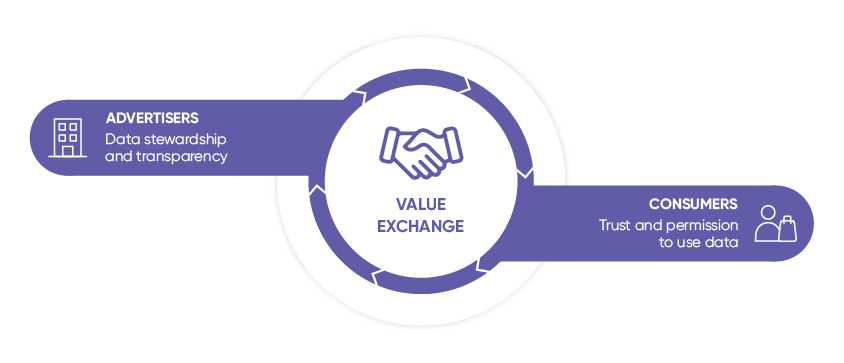Data privacy is the basis of assurance of security with transparency between brand owners and consumers. It presents the purpose and usage of collected data to consumers.
The fundamentals to define data privacy are the data collection process, purpose, and occasion. In explaining the purpose of data privacy policies, companies often address these crucial aspects that help drive the process.
Thus, data privacy policies help build transparency and trust between consumers and brands.
First-party data is intertwined with data privacy. It helps build trust among people who visit a brand’s website and /or use the brand. Best practices in collecting first Party data itself ensure the highest compliance with data privacy regulations.

The key purposes that drove the need for data privacy are as below:
- Brands may get too intrusive
Often consumers come across situations where they are asked to provide very personal information that is often unrelated to the brand purposes or programs. A sense of discomfort prohibits many consumers from providing such information. Some companies collect such data for selling to other companies.
The basic norm of collecting first-party data is to keep it protected by the key data stakeholders of the company and restrict it only to the information that is critical for the brand.
Companies that follow the best practices always collect data under strict data governance guidelines and review the data collection process regularly to ensure compliance.
The data governance guidelines implemented by the competent authorities are meant for protecting consumer privacy in an environment where certain enterprises themselves don’t comply with the best practices and thus make consumer privacy extremely vulnerable.
- Public data misconduct
The absence of strict data governance and the best practices within certain companies lead to data misuse and misconduct. Such situations not only antagonize the consumers but also impact the brands adversely. It results in a loss of consumer confidence and trust in such companies. To avoid such unwelcoming situations, it becomes necessary to implement organized data governance that protects the consumers’ interests.
- Deploying inaccurate information
While deploying first-party data improves decision accuracy, when implemented beyond the stipulated data validity period, results in wrong information and interpretation about the consumers. Marketing programs based on such data led to consumer disconnect and irritation. A proper data management guideline that sets the right norm was essential to overcome such inappropriate deployment of data.
- Confusing data privacy policies
Data privacy policies become quite limiting with the overflowing of various types of data collected from various sources with multiversal purposes e.g., second- or third-party data revolution.
The old data management norms have become insufficient and required redefining the scopes, purposes, and relevant restrictions to protect consumer interests and privacies.
- Evading “creepy” advertising
“Creepy” advertising often results from having access to an individual’s information collected without his/her knowledge. To stop such situations where the consumer feels vulnerable and threatened, setting up a consented data collection mechanism that clearly defines the purpose of data collection is crucial.
Acquiring and using first-party data, the set, is the best practice for improved data privacy. However, it is important to institute data privacy laws supported by new technologies that make first-party data even more robust.
- The General Data Protection Regulation (GDPR)
GDPR influences data privacy in a big way. GDPR guidelines emphasize that companies must prove that the data collection is done ethically. Thus, many companies employ a data protection officer to keep a strong vigilance, however, such initiatives have limited application where an enterprise is largely dealing with second or third-party data.
First-party data makes proving consent easier as an enterprise is able to prove when and how users consented to their data being collected on the company’s website or app.
- The California Consumer Privacy Act (CCPA)
The CCPA is similar to the GDPR, while this act has further raised the bar for honoring and protecting consumer data privacy rights.
Like the GDPR, the CCPA requires companies to prove that they’ve collected data with consent. First-party data makes this more manageable and transparent.
One key benefit of CCPA over GDPR is that consumers are able to opt out of having their personal data sold without being penalized for doing so.
Companies that follow first-party data best practices don’t intend to sell data, making compliance with the CCPA easier.
- Third-party cookie blockers
Third-party tracking cookies are often used in advertising, retargeting and cross-site tracking. This is a process of one company placing another company’s cookie on their website. Such cookies are different from first-party cookies, which remember log-in details and perform other valuable functions that drive a good user experience.
Blocking such intrusive third-party cookies improves data privacy and reassures users that their data aren’t being shared with any other companies. This also minimizes the chance of consumers experiencing “creepy” communication, as mentioned earlier.
Apple, Mozilla, and other web browsers have started to block these third-party tracking cookies.
Google originally announced its plan to phase out support for third-party tracking cookies in Chrome — called the Privacy Sandbox API testing initiative — within two years in early 2020. However, Google has recently announced to delay in its plan to block third-party tracking cookies in the Chrome browser until the second half of 2024.
But all these giants unanimously agree that first-party cookies are better for users because they reduce the ability to track consumers across the internet— improving data privacy and user comfort.

“Trust factor drives loyalty”
Grivy, as the consumer data platform, is extremely sensitive to and strictly abides by the prevailing data privacy best practices while collecting first-party data for their clients. It helps brands connect with their core consumers through a transparent, ethical value-exchange program. It creates superior user experiences by white labeling the consumer journey on their path to purchase with the brand visuals/designs. It further supports collecting first-party data for the brand that is fully consented to.
Given the fact that Grivy follows the best-in-class practices on data privacy, it has successfully passed through the data privacy compliance requirements of large multinational enterprises.











